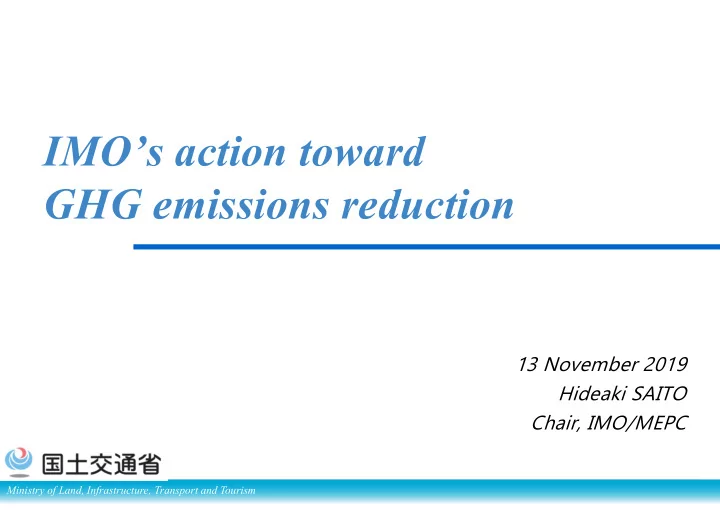

IMO’s action toward GHG emissions reduction 13 November 2019 Hideaki SAITO Chair, IMO/MEPC Ministry of Land, Infrastructure, Transport and Tourism
International Maritime Organization (IMO) IMO: a specialized agency of the United Nations which is responsible for measures to improve the safety and security of international shipping and to prevent pollution from ships History : Established in 1958, Headquarters in London Memberships: 174 Member States, three Associate Members, 64 intergovernmental organizations, 81 international non-governmental organizations Maritime Safety Committee ( MSC ) Assembly Council Carriage of Cargoes and Containers ( CCC ) Human Element, Training and Watchkeeping Marine Environment Protection ( HTW ) Committee ( MEPC ) Implementation of IMO Instruments ( III ) Legal Committee ( LEG ) Navigation, Communications and Search and Technical Cooperation Rescue ( NCSR ) Committee ( TC ) Pollution Prevention and Response ( PPR ) Facilitation Committee ( FAL ) Ship Design and Construction ( SDC ) Ship Systems and Equipment ( SSE ) 1
Marine Environment Protection Committee (MEPC) MEPC has a role to address environmental issues, and to discuss and develop measures among member States based on MARPOL Convention. Main agenda items in recent years include: Greenhouse Gas emission Sulphur Oxides Nitrogen Oxides Ballast water management Marine plastic litter etc. 2
International efforts to tackle the climate change IMO adopted the GHG Strategy in April 2018 The first global commitment by an industrial sector, without differentiation amongst the countries 2030 2050 ~2100 2023 2008 Base CO 2 /ton-mile CO 2 volume Phase out level ∆40%* ∆50%* GHG *Compared to 2008 Candidate measures 【 Short-term 】 【 Mid-term 】 【 Long-term 】 • Design improvement • Market-based Measures • Zero-carbon fuels (e.g. strengthening EEDI *1 ) • Low-carbon fuels • Other possible new/innovative measures etc. etc. • Operational improvement (e.g. strengthening SEEMP *2 ) *1 EEDI : Energy Efficiency Design Index • National Action Plan etc. *2 SEEMP : Ship Energy Efficiency Management Plan 3
Programme of Follow-up Actions Now 2018 2019 2020 2021 2022 2023 MEPC MEPC MEPC MEPC MEPC MEPC MEPC MEPC MEPC 72 73 74 75 76 77 78 79 80 Programme of Follow-up Actions GHG Action Initiate Adopt Strategy Strategy Plan adjustment revision 3-step Step 1 Step 2 Step 3 approach Data collection Data analysis Decision 4th GHG Progress Final Scope TOR Tender Study report report Short-term Invite Concrete Consideration and decisions measures proposals proposals Invite Mid/long-term Consideration Progress measures proposals Impact Invite Finalize Measure-specific assessment, as appropriate procedure assessment proposals Technical Development and implementation of actions cooperation Start Phase 2 Phase 2 Start EEDI Phase 3 Phase 3 Review (if agreed for specific types) Phase 4 Consideration at CG 4
CO 2 requirement on new ships: EEDI regulation Mandatory goal-based energy efficiency requirement applied globally on new ships after 2013 Gradually strengthened in phased basis EEDI = Fuel carbon factor × Efficiency [GHG-kg/ton-mile] [GHG-kg/fuel-ton] [fuel-ton/ton-mile] Phase 3 2022/25~ Introduction of Phase 4 (20XX, ∆X%) ∆ 30-50% Phase 2 Ongoing work at the Correspondence Group 2020~ ∆ 20% Bottom-up exercise : develop a list of new technologies and alternative fuels along with GHG reduction potential, Phase 1 year of practical use and challenges 2015~ Backcasting from the 2050 target : consider how EEDI ∆ 10% can contribute to the initial IMO GHG Strategy Other technical issues : scope of application, technical 2013~ guidelines, evaluation of alternative fuels etc Entry into force 5
Proposed short-term measures on existing ships 20+ candidate short-term measures were proposed at MEPC74 Japan/Norway Mandatory Cap on energy efficiency existing ship index, e.g., engine power limit Denmark/Germany/Spain Mandatory Cap on annual average of energy efficiency France/Clean Shipping Coalition(CSC) Mandatory Cap on annual average of speed International Chamber of Shipping(ICS) Mandatory audit of the Ship Energy Efficiency Management Plan (SEEMP) World Shipping Council(WSC) Mandatory R&D contributions per tonne of fuel 6
Global initiatives involving the industries Getting to Zero Coalition Poseidon Principles 7
THANK YOU! 8
Recommend
More recommend